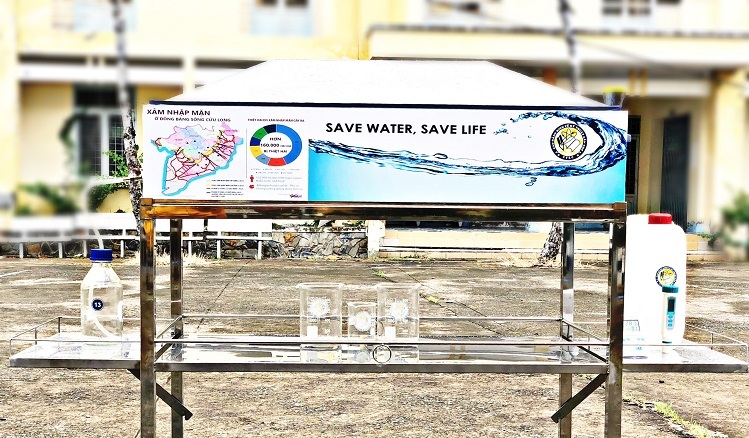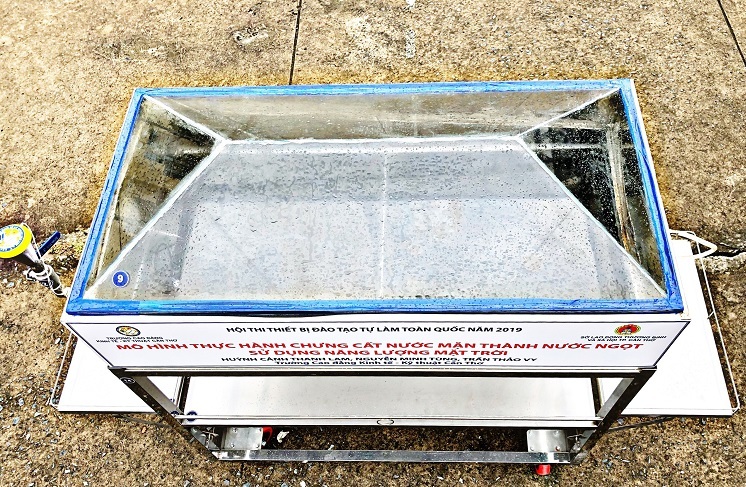Taking part in a field trip to An Giang in 2017 during a drought, MSc Huynh Canh Thanh Lam, (28 years old, Can Tho College of Economics and Technology) witnessed people living without fresh water to drink. They had to buy for 10 times more expensive fresh water than usual. Having experience in creating models of tectonic wetlands, using plants to treat water, he thought of finding solutions to help people have fresh water to use. Returning to school, he and a colleague planned to build a simple model that turns salty water into fresh water for people.
 The product to distillation of salt water into fresh water. Photo: NVCC
The product to distillation of salt water into fresh water. Photo: NVCCWithout expensive use of electricity, Mr. Lam took advantage of the heat radiated from the sun to be the main source of energy for the model, helping to reduce costs for people. The product has two main parts including a distillation chamber and a stainless steel rack frame.
Saline water is poured directly into the 0.5 m2 distillation chamber, on top of which are four glass faces to catch sunlight from all directions, bringing the temperature to the highest level, reaching 70 celsius degrees. "At this temperature, the water evaporates and gives the same amount of distilled water as 100 degrees." said Lam.
 Above the distillation chamber are four glass panels to capture the highest amount of solar heat. Photo: NVCC
Above the distillation chamber are four glass panels to capture the highest amount of solar heat. Photo: NVCCFresh water condenses on the glass and flows down the pipe leading to the outside tank. If bringing fresh water samples after distillation for testing, the salinity in the water completely disappeared, especially coliform and E.coli bacteria were not detected, reaching the quality of domestic water.
In addition, this model can remove dissolved salts in brackish water, groundwater or to form clean water. The quality of fresh water obtained reaches the allowable limit according to the criteria for the exploitation of water for domestic use by individuals and households.
According to MSc Lam, with this principle, the model can provide fresh water to drink for a household of 4 people in a day. The maximum operating time of the model is from 8-16 hours, with 7 liters of salt water volume, 2.5 liters of fresh water can be obtained.
MSc Lam said, depending on the characteristics of the water source in that small area, the model can integrate a dust filter placed at the outlet of the fresh water source. The whole model was built at a cost of only 2 million VND without need of electricity.
The research team has donated to a number of households in An Giang area and now the model is used to teach in schools about energy and water phenomena.
Ha Tran










 Energy Efficiency and Conservation: Technology as the “Key”
Energy Efficiency and Conservation: Technology as the “Key”
 Opening of the 2025 Energy-Efficient Equipment and Green Transition Exhibition Fair
Opening of the 2025 Energy-Efficient Equipment and Green Transition Exhibition Fair
 Consultation on the methodology for developing and updating energy consumption standards for four major industrial sectors
Consultation on the methodology for developing and updating energy consumption standards for four major industrial sectors
 Energy-saving solutions and green transition promotion
Energy-saving solutions and green transition promotion
 The 9th VEPG Steering Committee Meeting: Strengthening Coordination for Viet Nam’s Just Energy Transition
The 9th VEPG Steering Committee Meeting: Strengthening Coordination for Viet Nam’s Just Energy Transition